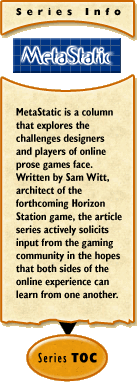 Hate is Good
Hate is Good
by Sam Witt
November 29, 2000
In the world of online gaming, there is a dearth of Bad Guys.
Now, granted, there are a lot of things to beat on, ensorcel, explode, and generally bash into nothingness, but they're just not... bad enough to be really satisfying. If you've read past installments of MetaStatic, then you know I'm heavily into community building via the medium of online games, and bad guys are a big part of these communities.
By Bad Guys, I mean real, thinking foes for the heroes to strive against. Not quirky AI-driven monsters with non-existent tactics, those are a dime a dozen. I'm talking villains, antagonists you can't wait to get lay into. Win or lose, the rush from going up against another player is arguably the most exciting to be found.
Research tells me that about half of you are frothing at the mouth by now, because the idea of Player versus Player conflict does not sit well with a lot of the online community. Let me mollify at least some of you by saying that I do not believe in unrestricted player conflict. Like any seasoning, a confrontation with other players is best when not over done.
The thing is that communities need something to not only rally around, but to rail against. There can't be heroes without villains, and NPCs and computer AI just don't make convincing bad guys. And there just aren't enough GMs to play all the bad folks you'd need to make them noticeable, which leaves us with player-driven villains.
The question is, where do you draw the line? Unrestricted Player versus Player (hereafter referred to as PvP) conflict is obviously out of the question, especially if that conflict can result in a real or perceived 'loss' that one player is unwilling to sustain.
To most people, the above almost always refers to combat of some sort. No one, after all, wants to have their character killed and/or robbed by another player-driven character. But there are other forms of loss, ones that are much more difficult to adjudicate and which cannot be restricted in any way.
As an example, my Castle Marrach character has a horrible reputation as a result of a relatively minor confrontation with a relatively major player-driven character. It was, through no intention of my own, a case of PvP and I lost. No blows were exchanged, only a few harsh words on both sides, but this character is now heavily compromised within the confines of Castle Marrach and it will probably take a great deal of time to rebuild his (or her, I ain' tellin') reputation to the point where he can actively participate in much of what makes Castle Marrach entertaining.
In a way, my character is now a player-driven villain, but one that is unsupported by the system or conventions of the Castle. Unless he reforms, he won't be made part of the Castle's community except peripherally, and will have to go to a great deal of effort to involve himself in most storylines. There's nothing wrong with this, as Marrach is a more cooperative storytelling venture than is commonly found in these communities, but in most other games, this is a very real problem.
Take, for existence, Everquest. There is very little social structure built into the game, with the exception of the Guild. These groups of players often band together to take on the tougher challenges the game world has to offer. In fact, without a strong guild, there are areas of the game world that players will never see. Which means, in many cases, that if you play a villain, you are going to be excluded from large parts of the game.
And that's just wrong. Our game communities need PvP, we need the kinds of intelligent conflict that results in the dramatic moments you will never have when competing against a computer's AI. But villainy needs to have its own set of rewards and penalties to make it a useful part of the community.
This is where most games, in my opinion, have gotten it wrong. Generally, there are only two reasons PvP is initiated – to get the other character's stuff, or to 'prove' that the aggressor is somehow better than the victim. Both of these are anti-social and detrimental to the victim's experience of the game. Yet both persist because they are rewarding to the attacker.
We can see, then, that we need ways to reward the PvP aggressors in undertaking activities that promote conflict that is acceptable to both parties; alternatively, the victim needs some way to mitigate their losses so that they are at an acceptable level should they suffer a PvP attack. Is there a way that this can work? Can the PvP aggressors be channeled so that the activities that are most rewarding to them work for the benefit of the community as a whole?
I'd like to believe so, and I'm working on something that might just do it. I'll probably always believe that PvP can be helpful, and that Hate is Good – at least as a way to pull our communities together. Or I could be wrong – let's hear what you have to say.



